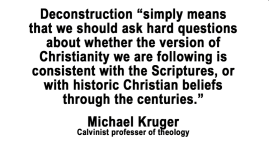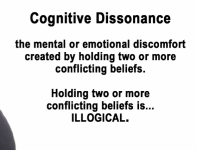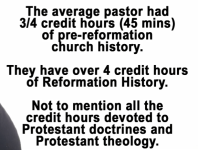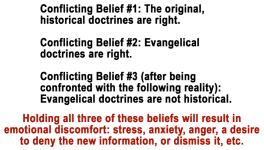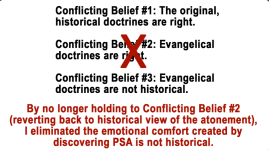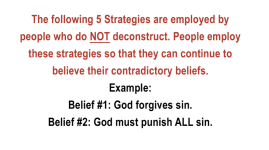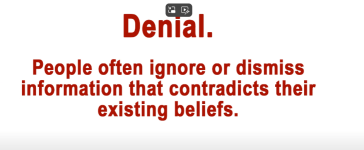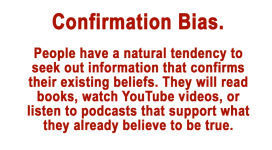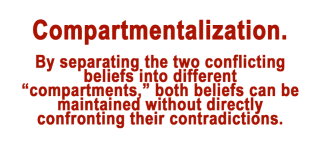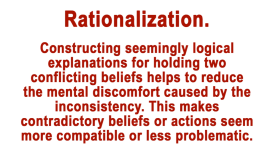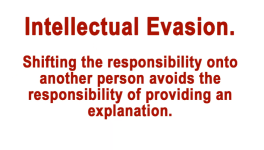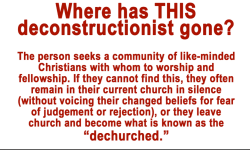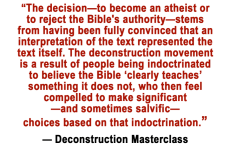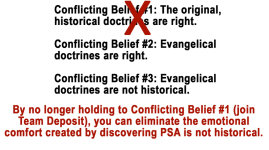The LOGICAL reasons people deconstruct | 5 strategies Evangelicals use to NOT deconstruct
1,224 views views
In this episode, we look at 5 strategies employed by Evangelicals that prevent them from deconstructing. And we look at the REAL reason why Deconstructionists often choose either 1) atheism or 2) to remain Christian but reject the authority of the Bible, and why they are forced to do so.
1,224 views views
Description
In this episode, we look at 5 strategies employed by Evangelicals that prevent them from deconstructing. And we look at the REAL reason why Deconstructionists often choose either 1) atheism or 2) to remain Christian but reject the authority of the Bible, and why they are forced to do so.
Summary
- Cognitive dissonance occurs when individuals hold conflicting beliefs, causing emotional discomfort. This discomfort often leads them to reevaluate and potentially deconstruct their previously accepted doctrines.
- Deconstruction in a religious context refers to the critical examination of one's beliefs and doctrines, questioning their alignment with scripture and historic Christian teachings.
- Deconstruction helps in resolving cognitive dissonance by allowing individuals to analyze and discard one of the conflicting beliefs. This process leads to a more coherent belief system, eliminating the emotional distress associated with maintaining contradictory beliefs, ultimately resulting in clearer decision-making and a sense of emotional comfort.
- Cognitive dissonance is the mental conflict that arises when an individual holds two or more contradictory beliefs or values, leading to feelings of discomfort. This often manifests in everyday decisions through rationalizations, such as indulging in unhealthy food despite knowing its negative effects, to reduce the emotional discomfort caused by the conflicting beliefs.
- Grasping the historical context of Christianity can provide clarity and clarity to individuals who feel conflicted about modern interpretations of scriptural texts, empowering them to create a belief system that is consistent and true to their experiences.
- Individuals often struggle with the fear of judgment and rejection, leading them to remain silent about their changing beliefs. This can result in feelings of isolation and conflict between their faith and new understandings.
- "Door Number Three" represents an alternative path that allows individuals to reconcile their faith with their evolving beliefs without completely discarding the authority of the Bible, promoting a more nuanced and historically informed understanding of Christianity.
- Cognitive dissonance refers to the discomfort experienced when one's beliefs are in conflict, prompting individuals to either alter their beliefs, seek new interpretations, or abandon their faith altogether to achieve internal harmony.
The LOGICAL reasons people deconstruct | 5 strategies Evangelicals use to NOT deconstruct
Understanding Deconstruction in Christianity 00:30
"Deconstruction is asking hard questions about whether the version of Christianity we are following is consistent with the scriptures or with historic Christian beliefs through the centuries."
- Deconstruction is often misunderstood, especially in Evangelical circles where it's associated with a rejection of faith. In truth, it is a process of critically evaluating one's beliefs against Biblical scriptures and historic Christianity.
- The speaker references Michael Krueger’s definition, emphasizing that it involves questioning the consistency of one’s beliefs with established Christian doctrines across history.
- Many people perceive deconstruction as demolition, equating it to abandoning Christianity altogether. However, the intent is to seek a deeper understanding rather than to disparage the faith.
Emotional Components of Belief Rejection 02:18
"An emotional reaction to a doctrine that slanders God's character is not historical and is not exegetical."
- The emotional aspect of rejecting certain doctrines is often discounted, where it's labeled as a lack of logical reasoning. Yet, emotional responses are valid and can arise from the realization that some accepted beliefs may misrepresent God's nature.
- Cognitive dissonance is a significant factor here; it occurs when individuals hold conflicting beliefs, leading to discomfort that prompts them to scrutinize their doctrines further.
- This process is not merely emotional; it reveals the logical inconsistencies in accepted doctrines and invites individuals to reassess what they believe.
Historical vs. Evangelical Doctrines 06:00
"If you’ve shared the same beliefs as me and watched the past videos, you have been confronted with the fact that Evangelical doctrines are not historic."
- The notion that Evangelical doctrines are synonymous with historic Christian beliefs is called into question. Many traditional Evangelical doctrines do not align with the original historical teachings, which creates cognitive dissonance for believers who are faced with this disparity.
- When confronted with these conflicts, individuals may dismiss the new understanding in favor of maintaining their long-held beliefs, or they may begin to reevaluate their entire approach to faith and doctrine.
- This cognitive dissonance can act as a powerful impetus for deconstruction, fostering a genuine investigation into the validity of one’s belief system.
Strategies for Managing Cognitive Dissonance 09:45
"People often ignore or dismiss information that contradicts their existing beliefs."
- Individuals often utilize various strategies to cope with the emotional discomfort caused by holding conflicting beliefs, such as denial, where they ignore contradictory information.
- Confirmation bias leads people to seek out information that supports their existing beliefs, reinforcing their current viewpoint without critical reassessment.
- Compartmentalization allows individuals to separate conflicting beliefs into different "compartments" of thought, preventing direct confrontation of their contradictions.
- Rationalization involves creating plausible explanations for holding contradictory beliefs, making them easier to manage mentally.
- Finally, intellectual evasion shifts the burden of justification onto external sources, allowing individuals to avoid confronting the inconsistencies of their beliefs directly.
Cognitive Dissonance and Emotional Strategies 12:03
"It's impossible to know the truth; therefore, I'm going to eat ice cream every night because it's impossible to know whether that's healthful or not."
- The speaker introduces the notion of cognitive dissonance, explaining how individuals often engage in comforting behaviors, such as indulging in ice cream, as a way to cope with the uncertainty of conflicting beliefs regarding health and well-being.
- They outline dominant strategies used to manage cognitive dissonance without actually addressing the underlying contradictions. These strategies serve to minimize emotional discomfort, allowing one to feel at ease while holding conflicting beliefs.
The Process of Deconstruction 13:07
"Deconstruction is examining and rejecting a strategy while eliminating one of the conflicting beliefs."
- The process of deconstruction involves critically evaluating and ultimately eliminating one of the conflicting beliefs to resolve cognitive dissonance.
- The speaker illustrates this by offering two options: deleting the belief that eating healthily is important while embracing the idea that enjoying a pint of ice cream nightly is a legitimate way to relax.
- Eliminating conflicting beliefs results in a more internally consistent belief system, free from cognitive dissonance and emotional distress.
Theological Implications of Conflicting Beliefs 15:24
"Cognitive dissonance arises from conflicting beliefs that cannot coexist logically."
- The speaker uses a theological scenario to present beliefs about biblical truths and their inherent contradictions, particularly concerning the actions of Jesus and interpretations of sin.
- They highlight how beliefs such as "the Bible is true" and "Jesus did not sin while consuming wine" create conflicting mental states, leading to cognitive dissonance.
- Various coping strategies include denial of biblical truths, compartmentalization of belief systems, rationalization, and even intellectual evasion, with the speaker humorously illustrating each method.
Resolution Paths after Deconstruction 21:19
"A person can transition from holding conflicting beliefs to adopting a consistent belief system."
- After deconstruction, individuals have multiple paths they may follow regarding core beliefs. These include rejecting the idea that Jesus was sinless, deeming the Bible contradictory, or reaffirming a belief in the Bible's authority while redefining what sin means.
- The speaker emphasizes that in the final option, one can maintain their faith while reconceptualizing what it means to drink in moderation, concluding that this approach allows a person to reconcile faith with their beliefs without sacrificing logical consistency.
The Search for Like-Minded Community 24:04
"Many Christians seek a community of like-minded individuals to worship and fellowship with."
- Many individuals find themselves longing for a space where their evolving beliefs are accepted, leading them to seek out communities that resonate with their faith journey.
- If they cannot find such a community, they often choose to stay in their current church in silence, concealing their changed beliefs out of fear of judgment or rejection.
- In some cases, they may leave the church altogether, becoming part of the "dechurched," a term used to describe those who have distanced themselves from traditional church settings.
The Impact of Conflicting Beliefs 24:20
"The conflicting beliefs can lead to significant cognitive dissonance."
- Individuals with conflicting beliefs experience cognitive dissonance, which creates a psychological discomfort due to the inconsistency of their faith practices and personal beliefs.
- This dissonance can lead them to reject Christianity entirely or to retain their Christian identity while questioning the authority of the Bible, seeking moral guidance from alternative sources, such as cultural norms.
- The pressure from well-meaning individuals often reinforces their sense of confusion, as they are compelled to conform to interpretations of biblical doctrine that may not accurately represent the text.
The Dangers of Misinterpretation 26:30
"Insisting that the Bible clearly teaches something can have extreme consequences."
- When individuals are indoctrinated to believe that the Bible clearly teaches certain doctrines, it can lead them to make significant life choices based on those interpretations.
- This misinterpretation may foster a sense of betrayal when they realize that those teachings might not align with historical or exegetical understandings of the Bible.
- The deconstruction movement often emerges as a reaction to these teachings, where individuals feel the need to reevaluate and potentially reject the foundations of their faith.
Introducing Door Number Three 27:10
"There is a third option: an understanding of historical and biblical Christianity."
- This perspective emphasizes that individuals struggling with their faith can find a middle ground, referred to as "Door Number Three," which allows them to resolve their cognitive dissonance without abandoning their belief in the Bible.
- This alternative does not require rejecting biblical authority but instead seeks to eliminate conflicting beliefs through a deeper understanding of Christianity's historical context.
- The channel aims to provide support for those engaging in this process of deconstruction, assuring them that their struggles are valid and that they are not alone in seeking a coherent theological framework.
Emotional Struggles of Deconstruction 27:50
"Deconstruction can be emotionally taxing and lead to feelings of isolation."
- Many individuals wrestling with their faith experience emotional turmoil as they navigate the complexities of rejecting established doctrines while trying to maintain their spiritual identity.
- They often feel a sense of despair as they face the potential consequences of rejecting the authority of the Bible, questioning what it means for their faith and identity.
- The content encourages these individuals by highlighting that there is a viable alternative to merely choosing between total rejection of faith or acceptance of potentially flawed interpretations.

